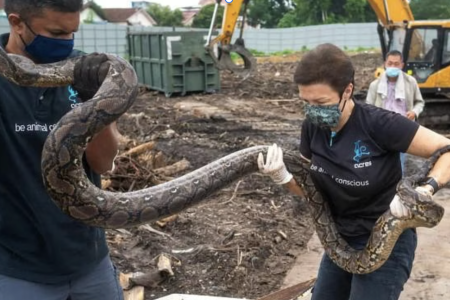Repeatedly bitten but never shy
Getting bitten by pythons while on the job is probably the average man’s nightmare. But for co-chief executive of Acres (Animal Concerns Research and Education Society) Kalaivanan Balakrishnan, it’s all in a day’s work.
Over the past 13 years, the 38-year-old has caught more than 1,000 snakes – from boa constrictors to spitting cobras. It is a job that requires alertness, experience and a deep knowledge of animals.
Recently, when a reticulated python was perched on an air conditioner compressor outside an HDB flat in Jurong, Mr Kalai had to ascertain how the reptile was positioned before he climbed up to retrieve it.
“I looked down and up to see how it was positioned,” he explained. “If a python is coiled in a certain way, it could mean it’s about to strike.”
Mr Kalai’s knowledge and confidence in handling pythons grew over time. He caught his first python by himself after just two months on the job. By 2012, due to staffing shortages at Acres, he found himself frequently carrying out snake rescue operations on his own.
“I was just catching left and right without any equipment,” he said. “Once you know their power and how they move, you won’t have concerns. Most pythons are not aggressive; they are just defending themselves when they feel threatened. But, of course, you can never be too cautious when handling snakes.”
One type of snake that has given him sleepless nights in the past is the spitting cobra – a venomous snake that spits venom when threatened.
“They spit into your eyes to blind you so they can evade you,” Mr Kalai explained. “While the venom doesn’t penetrate the skin, it can cause significant irritation if it gets into the eyes.”
He has been spat on by a cobra on more than one occasion. Thankfully, he knew not to rub his eyes, and gently wash the “spit” off with water.
“When you rub your eyes after being spat on, you risk rupturing small blood vessels and you allow the venom to enter the bloodstream,” he said.
Despite the ban on owning pet snakes in Singapore, illegal imports of species such as ball pythons, Burmese pythons, king snakes and milk snakes still persist. Mr Kalai warns against this practice, emphasising that it ultimately causes more harm to the animals than good.
When asked which animal he feared the most, his answer would surprise many.

Never mind the 4m-long pythons or the large monitor lizards and their sharp claws; Mr Kalai’s biggest foe is the humble, furry squirrel.
“The squirrel bite is a different level of pain,” he said, adding that the cute appearance and demeanour of the rodent is “deceiving”. “Gun to my head, I would put my hand in to get bitten by a python rather than a squirrel.”
Though he has always loved animals, Mr Kalai’s journey into wildlife rescue was not something he planned for growing up. He studied industrial design at Lasalle College of the Arts and began his career as a designer. But after a while, due to a lack of opportunities within the industry, he decided to pursue his passion for animals. In 2010, he contacted Acres founder Louis Ng and joined the organisation as a rescue officer.
“I always wanted to help animals, even though my parents thought it would be a lowly job. I earned just $900 a month when I started out – but I embraced the challenge,” he said.
Aside from snakes, Mr Kalai has also rescued crocodiles, dolphins, civets and bats.
He once rescued a 1.5m-long crocodile in Jurong, and said “there is no margin for error when rescuing such a reptile”.
“It was an adrenaline-pumping experience that required teamwork and precise handling techniques,” he said.
In 2018, he found himself involved in a rare encounter with a dolphin. The mammal had been entangled in fishing nets, and Mr Kalai and his team of volunteers were under pressure to free it in time.
“I had never seen a dolphin before, and it was entangled in some 8kg of fishing nets. By the time we got there, we feared the dolphin wouldn’t survive. But we acted quickly, and the dolphin was freed after an hour.”
Ms Anbarasi Boopal, co-chief executive of Acres, recalls that incident and Mr Kalai’s steadfastness.
“Kalaivanan has no bias towards any animals or any rescue operation – an injured python is treated with the same compassion as a wounded pigeon,” said Ms Anbarasi, who has been with Acres since 2006 and trained Mr Kalai during his early days with the organisation.
“When rescuing the dolphin, Kalaivanan made the quick and correct decision to release it back into the ocean instead of bringing it into captivity to treat the lesions on its body caused by the fishing nets.”
Mr Kalai said: “Sea mammals are known to survive such things because the salt water prevents infection. It was a decision made with the animal’s best interests in mind.”
At Acres, Mr Kalai remains committed to educating the public about co-existing with wildlife, and advocating for compassionate treatment of all animals, regardless of whether they slither or soar.
To that end, Acres conducts campaigns and workshops for all age groups, from pre-schoolers to corporate adults, offering programmes on topics such as animal sentience, leading an animal-friendly lifestyle, tackling the illegal wildlife trade and coexisting with Singapore’s wildlife. Educational guided tours, where visitors learn about rescued wildlife, are also available.
Volunteering opportunities at Acres include the Sanctuary Volunteer Programme, open to those aged 18 and above. It involves daily animal care tasks such as feeding and cleaning. For volunteers 21 and older, the Wildlife Rescue Programme provides hands-on training for rescue missions involving injured or distressed animals.
Get The New Paper on your phone with the free TNP app. Download from the Apple App Store or Google Play Store now


